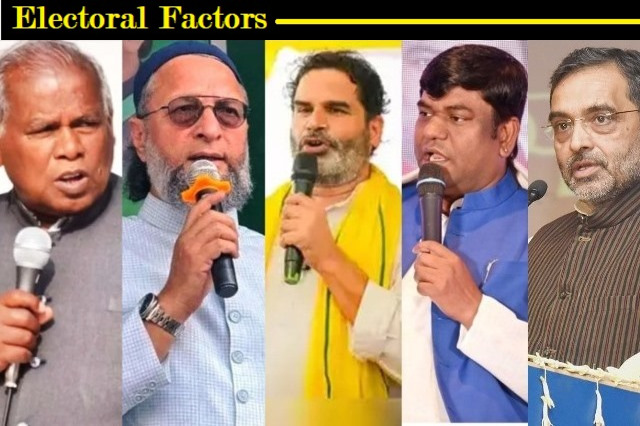
Bihar’s Battle of Promises and Power Brokers
As the campaign for the first phase of 121 Assembly seats draws to a close this evening, Bihar stands at the threshold of an election that could redefine its political and social contours. The rhetoric has been fierce, the promises grand, and the underlying message unmistakable, and this is an election where jobs, not just caste, have taken centre stage.
Congress leader Rahul Gandhi’s rallies in Purnia and Bahadurganj mark an attempt to reclaim the party’s lost bastions in Seemanchal, a region that once echoed with Congress slogans. Meanwhile, Prime Minister Narendra Modi’s whirlwind of rallies and roadshows has sought to reinforce the NDA’s dominance. Yet, amid the noise of campaign slogans, one issue has resonated deeply across Bihar’s dusty lanes, employment.
Tejashwi Yadav’s bold promise of providing one government job per family has electrified young voters. The Grand Alliance (Mahagathbandhan) has gone a step further, pledging to legislate this promise within 20 days of taking office. The NDA, however, has dismissed it as “a bundle of lies,” arguing that such a move would require funds far exceeding Bihar’s entire budget. For now, analysts agree on one thing, the youth’s verdict could inaugurate a new era in Bihar politics.
But beyond this headline contest between the NDA and the Mahagathbandhan lies another, more complex battle — that of the smaller yet strategically crucial parties and their leaders who often punch above their electoral weight.
The EBC Equation and the ‘Son of Mallah’: Mukesh Sahani, the self-styled ‘Son of Mallah’ has emerged as a significant factor in the Mahagathbandhan’s social arithmetic. Projected as the prospective Deputy Chief Minister, Sahani’s Vikassheel Insaan Party has been allotted 15 seats, underscoring his bargaining power. Representing the Mallah community — part of the Extremely Backward Classes (EBCs) — Sahani challenges Nitish Kumar’s traditional hold over this group. The BJP, unwilling to cede ground, has countered with prominent Mallah figures in key constituencies, turning the EBC vote into a tug-of-war.
Manjhi’s Mushahar Base and Familial Politics: In the Magadh region, former Chief Minister Jitan Ram Manjhi continues to rely on the Mushahar community, another decisive Scheduled Caste bloc. His Hindustani Awam Morcha (Secular) remains a small but vocal player, often negotiating its relevance within larger alliances. True to form, Manjhi’s brand of family-centric politics persists — three of his six party tickets have gone to relatives, a move that reflects the personalized nature of Bihar’s politics.
The Silent Strength of Upendra Kushwaha: Upendra Kushwaha’s return to prominence represents another subplot in this intricate drama. Commanding influence over the 6–7% Kushwaha (Koeri) vote bank, he holds sway in roughly 40 constituencies. Together with the Kurmis, this forms the “Luv-Kush” equation that once bolstered Nitish Kumar’s rise. Having lost his Lok Sabha seat in Karakat, Kushwaha now seeks redemption and could yet emerge as the NDA’s silent trump card.
PK and AIMIM Factors: Adding to the intrigue is Prashant Kishor’s Jan Suraaj movement, which has positioned itself as an alternative to both mainstream alliances. While Kishor’s outfit may not win many seats, it threatens to fragment the traditional vote banks particularly among youth and first-time voters disillusioned with old politics. In Seemanchal, Asaduddin Owaisi’s AIMIM adds another layer of complexity. With about three dozen candidates in the fray, the party’s growing influence could chip away at the Mahagathbandhan’s Muslim–Yadav base.
Bihar’s election this time is not just a clash of alliances but a contest between aspiration and arithmetic. Employment, dignity, and representation have converged into a powerful political narrative. Whether Tejashwi’s promise of jobs or the NDA’s emphasis on stability finds greater resonance remains to be seen. But one thing is certain that as Bihar’s youth line up to vote, they are no longer just participants in a caste calculus but are potential architects of a new political order.
(Sidharth Mishra is an Author, Academic and President of the Centre for Reforms, Development & Justice)
Since today the campaigning of all parties who all are in fray has come on a halt since today evening for the first phase of voting on 6th. November, I am keeping my serious attention on almost every articles and news on social media channels, believe me, I have not come across with anything so effectively said in such a precious way that covers every aspects so effectively related to the state election vis-a-vis hidden agendas of various political parties.
Once again I truly appreciate your views so effectively on the specified topic.
Thank you Sir



